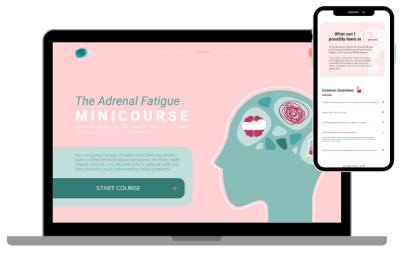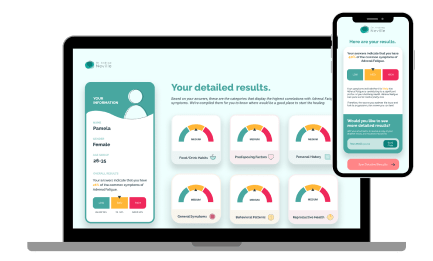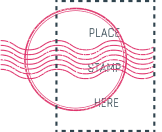Hypothyroidism and Adrenal Fatigue
If you’re dealing with a suppressed thyroid and all of the symptoms that come with it, chances are your doctor may be treating your thyroid with medication. This may provide a temporary solution, but it does not heal the root problem.
Undiagnosed Adrenal Fatigue is often the ugly face that lies behind hypothyroidism, Hashimoto’s, and any other thyroid production issue.
There’s an intrinsic connection between the thyroid and the adrenals. Problems may surface as typical hypothyroid symptoms, such as dry skin, hair loss, weight gain, even depression. But there is something deeper going on.
Adrenal Fatigue is at the root of thyroid disorders. When the adrenals are overstressed and thrown out of balance, the whole body falls out of balance. Symptoms manifest in many ugly ways, and a troubled thyroid is one of them.
Adrenal Fatigue is at the root of thyroid disorders.
Unfortunately, well-meaning doctors often treat thyroid disorders without looking into the possibility of Adrenal Fatigue, aka Stress Response Dysfunction (SRD). Treating just the thyroid may bring relief, but if Adrenal Fatigue is the underlying problem, that relief won’t last.
Adrenal Fatigue is a highly-overlooked condition that Western medicine often discounts—but holistic medicine shows how this nuanced syndrome can wreak havoc on the thyroid and other body systems.
In order to understand this—as well as how Adrenal Fatigue affects the thyroid—we need to dive into the thyroid and adrenal connection.
The Thyroid and Adrenal Connection
The thyroid and adrenal glands are intimately connected, and the thyroid takes its cues from the adrenals. Think of the thyroid as the body’s engine. It produces the hormones that drive your energy and your metabolism. Your adrenals are your oil and gas. They produce other hormones that your body can’t function without.
If your oil and gas are running low from a chronically overworked stress response, your body slows down the engine (your thyroid) so that it doesn’t burn out. This is your body looking out for you, optimizing for survival.
Addressing Adrenal Fatigue will heal the underlying thyroid disorder for good.
In healthy conditions, the thyroid steadily produces hormones that are distributed throughout your body to support your metabolism and repair tissue. Low thyroid levels indicate that your body has used up what thyroid hormones you’ve produced; in other words, your thyroid can’t or isn’t keeping up with your body’s demand.
Your hypothalamus should perceive those low thyroid hormone levels and then tell the pituitary gland to tell the thyroid to produce more thyroid hormones. But the excess cortisol produced by the adrenal glands during the body’s stress response may stunt the thyroid’s regular production.
The Stress Response Trigger: Adrenal Fatigue and Thyroid Dysfunction
The body’s natural stress response puts the adrenals into overdrive, producing adrenaline and cortisol that is then sent to the rest of the body. The cortisol that goes to the brain tells the hypothalamus to stop stimulating the pituitary gland and the thyroid. Why? Because repairing the body is not the top priority—surviving the stress is.
Your body purposely slows down the thyroid so it doesn’t ‘burn out.’
And, the cortisol that’s directed to the thyroid hormones, which are spread throughout the body, further slows the thyroid by telling it to stop producing hormones. This essentially suppresses them into being less effective hormones.
Cortisol then surges to the thyroid hormone receptors of each cell throughout the body and makes them less responsive to any thyroid hormones that may have survived the previous attempts at suppression.
If that isn’t bad enough, the cortisol convinces the thyroid gland to release an inactive form of thyroid hormone (Reverse T3, or rT3). Once released into the bloodstream, rT3 binds to thyroid receptors, effectively inactivating these receptors so that any thyroid hormone that might still be lingering can’t bind and activate those cells.
In the short term, this doesn’t cause problems. You get through the stressful situation, and your body settles down. Cortisol filters out of your system, and your thyroid resumes its function as normal.
But if the stress response is prolonged over time, you can end up with serious, long-lasting problems. Ongoing hormone suppression, hypothyroidism, and adrenal fatigue are the inevitable outcomes.
What Is a Prolonged Stress Response?
With a normal, acute stress response, your body slows the thyroid to conserve resources to deal with the stress via the adrenals. When the stress is over, the body shifts out of the stress response, the adrenals slow down, and the stress hormones diminish.
But what if the stress response never shuts off? What if you are under chronic, perpetual stress over an extended period of time?
If this happens, your thyroid is chronically slowed down. This leads you to develop symptoms of hypothyroidism that become problematic enough that you go to the doctor and/or Google your symptoms.
Effects of Stress Response Dysfunction (SRD)
- Low energy
- General sluggishness
- Fatigue
- Impaired cognition
- Weakness
There may be toxin buildup (that could surface as weight gain) and constipation because nothing is running through your body “picking up the trash.” This often leads to a slowdown in tissue repair or the development of new tissue, which leads to symptoms like:
- Slow healing of wounds
- Decreased hair, nail, skin growth (i.e., hair loss, dry skin)
- Compromised cardiac function.
However, because your thyroid is suppressed by an ongoing stress response—not because of anything wrong with the thyroid itself—treating the thyroid without addressing the ongoing stress response will not solve the problem. The stress response and your fatigued adrenals need attention in order to restore your health.
Adrenal Fatigue is when the entire stress response system of the body no longer operates correctly, throwing the whole body out of balance.
Undiagnosed Thyroid Treatments
You know something is wrong, and your symptoms certainly point toward a thyroid problem. So why do your thyroid labs keep coming back normal?
Unfortunately, inconsistent standards for reading thyroid tests—as well as thyroid tests that measure the wrong factors—are all too common in this area of health. Doctors may order an incomplete set of initial thyroid tests, or they may only use a narrow set of parameters for interpreting the tests. This sets you up for a wrong or incomplete diagnosis.
If your test results look normal enough, doctors will chase your symptoms. They’ll get busy applying Band-Aids while your dysfunction creeps toward disease.
Hashimoto’s Thyroiditis & Adrenal Fatigue
If your thyroid dysfunction has been diagnosed as Hashimoto’s thyroiditis, an autoimmune disease that attacks the thyroid, then treating underlying adrenal fatigue is of utmost importance. I have seen many patients with the autoimmune thyroid disease Hashimoto’s—and all of them suffered from an underlying Adrenal Fatigue.
Unfortunately, doctors get busy applying Band-Aids while your dysfunction creeps toward disease.
The adrenal dysfunction causes both a suppression of thyroid hormone production (as we’ve learned) and a suppression and shift in the immune system. This combination results in autoimmune thyroid disease, and Hashimoto’s thyroiditis is the most common.
Hashimoto’s thyroiditis will never heal unless the underlying adrenal dysfunction is corrected.
Yes, you need thyroid hormone support, but long-term healing requires that you address the deeper conditions that led to the development of Hashimoto’s. The imbalanced immune system needs attention, as does the underlying adrenal fatigue.
Restore proper immune and adrenal functions, and you’ll regain the dynamic responsiveness of your entire endocrine system.
What Happens When Adrenal Fatigue Is Treated Just Like Thyroid Problems?
Short answer: Nothing changes.
Doctors are aware of the symptoms of thyroid dysfunction but aren’t aware of the symptoms of Adrenal Fatigue. They may hear you describe your fatigue, sluggish bowels, dry skin, and hair loss, and diagnose you with a thyroid problem. But without attention to your adrenals, they’re missing the full picture.
Hashimoto’s thyroiditis will never heal unless the underlying Adrenal Dysfunction is corrected.
Treating the thyroid will only be a temporary patch if the problem is Adrenal Fatigue. You may feel better for a little while, but you’ll crash again, probably worse than before. You have to get to the root cause.
Solution: Treat Adrenal Fatigue for Hypothyroidism & Other Issues
If you suspect thyroid problems, assess the adrenals properly. Get the appropriate preliminary testing for thyroid function. Treat the Adrenal Fatigue first for a minimum of 3-6 months.
You want to heal from the ground up. This means:
- Not chasing symptoms without identifying their root causes.
- Paying attention to subtle changes in bloodwork with an eye toward trends and dysfunction.
- Treating dysfunction before it becomes full-fledged disease.
- Controlling your symptoms while focusing on healing the dysfunction at its root.
By addressing underlying Adrenal Fatigue, any other treatment you may receive for your condition will be more effective and beneficial. Restore your adrenals to normal function, and you’ll be far more successful in balancing the thyroid hormones and healing the thyroid gland.





















